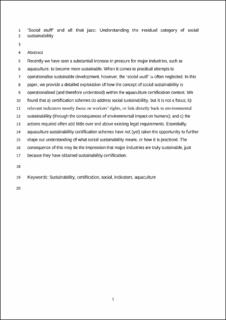| dc.contributor.author | Alexander, Karen A. | |
| dc.contributor.author | Amundsen, Vilde Steiro | |
| dc.contributor.author | Osmundsen, Tonje Cecilie | |
| dc.date.accessioned | 2020-09-30T06:57:12Z | |
| dc.date.available | 2020-09-30T06:57:12Z | |
| dc.date.created | 2020-08-19T14:17:01Z | |
| dc.date.issued | 2020 | |
| dc.identifier.issn | 1462-9011 | |
| dc.identifier.uri | https://hdl.handle.net/11250/2680405 | |
| dc.description.abstract | Recently we have seen a substantial increase in pressure for industries, such as aquaculture, to become more sustainable. When it comes to practical attempts to operationalise sustainable development, however, the ‘social stuff’ is often neglected. In this paper, we provide a detailed exploration of how the concept of social sustainability is operationalised (and therefore understood) within the aquaculture certification context. We found that a) certification schemes do address social sustainability, but relevant indicators mostly focus on workers’ rights, or link directly back to environmental sustainability (through the consequences of environmental impact on humans); and b) the actions required often add little over and above existing legal requirements. Essentially, aquaculture sustainability certification schemes have not (yet) taken the opportunity to further shape our understanding of what social sustainability means, or how it is practiced. The consequence of this may be the impression that industries are truly sustainable, just because they have obtained sustainability certification. | en_US |
| dc.language.iso | eng | en_US |
| dc.publisher | Elsevier | en_US |
| dc.rights | Attribution-NonCommercial-NoDerivatives 4.0 Internasjonal | * |
| dc.rights.uri | http://creativecommons.org/licenses/by-nc-nd/4.0/deed.no | * |
| dc.subject | Sertifisering | en_US |
| dc.subject | Certification | en_US |
| dc.subject | Havbruk | en_US |
| dc.subject | Aquavulture | en_US |
| dc.subject | Bærekraftsrapportering | en_US |
| dc.subject | Sustainability reporting | en_US |
| dc.title | ‘Social stuff’ and all that jazz: Understanding the residual category of social sustainability | en_US |
| dc.type | Peer reviewed | en_US |
| dc.type | Journal article | en_US |
| dc.description.version | acceptedVersion | en_US |
| dc.subject.nsi | VDP::Statsvitenskap og organisasjonsteori: 240 | en_US |
| dc.subject.nsi | VDP::Political science and organisational theory: 240 | en_US |
| dc.source.journal | Environmental Science and Policy | en_US |
| dc.identifier.doi | 10.1016/j.envsci.2020.06.003 | |
| dc.identifier.cristin | 1824093 | |
| dc.relation.project | Norges forskningsråd: 254841 | en_US |
| dc.description.localcode | "© 2020. This is the authors’ accepted and refereed manuscript to the article. Locked until 15.6.2022 due to copyright restrictions. This manuscript version is made available under the CC-BY-NC-ND 4.0 license http://creativecommons.org/licenses/by-nc-nd/4.0/ " | en_US |
| cristin.ispublished | true | |
| cristin.fulltext | postprint | |
| cristin.qualitycode | 1 | |

